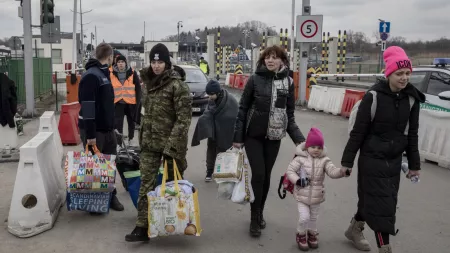With more than 1.8 million people having fled Ukraine to Poland in less than three weeks, the humanitarian organization CARE International warns of serious protection risks that refugees, especially women and girls travelling alone, are facing.
CARE’s humanitarian experts undertook a Rapid Gender Analysis in Poland to gain a better understanding of the gender-specific needs of refugees and to inform the humanitarian response. One of the main findings concerns the situation at border crossings: "Access to many of these crossings isn’t restricted, so one finds a lot of individuals – observed to be nearly exclusively men – gathered there offering refugees free rides to private accommodation in Polish and other European cities," tells Siobhán Foran, main researcher for the analysis.
While the majority of volunteers may have only the best intentions, this volatile situation causes major concerns for the safety of disoriented, often traumatized refugees, many of them single women and underage girls, warns CARE. "Uncontrolled access to, and exit from, these sites present the perfect conditions to attract human traffickers," warns Foran. "The Polish authorities need to urgently start to register names and car plate numbers as well as details of those who transport refugees to another location."
CARE’s report also reveals a significant data gap concerning the fast and steady influx of refugees to Poland. At the border crossings, there is no registration process. This allows for quick onwards travel but proves to be a challenge for short- and long-term humanitarian planning, as well as tracing and reunification efforts. Data sets disaggregated by sex, age, disability, and other factors are essential to plan adequate and customized humanitarian aid.
CARE warns that any long-running conflict increases the risk of exploitation and human trafficking. "When populations rely on other people to fulfill their basic needs, this can make them extremely vulnerable to various forms of abuse, exploitation and trafficking," notes CARE’s expert Siobhán Foran. "We’ve seen this in other conflict situations such as Yemen, Afghanistan, Venezuela and Syria, and anywhere where there is a power imbalance and a great humanitarian need, there will be people taking advantage."
The full CARE Rapid Gender Analysis report is available here.
About CARE: Founded in 1945, CARE is a leading humanitarian organization fighting global poverty. CARE has more than seven decades of experience helping people prepare for disasters, providing lifesaving assistance when a crisis hits, and helping communities recover after the emergency has passed. CARE places special focus on women and children, who are often disproportionately affected by disasters. To learn more, visit www.care-international.org.
As part of the Ukraine response, CARE International is currently partnering with People in Need, one of the largest non-governmental organisations in Eastern Europe and has provided humanitarian aid in the affected regions of Ukraine since the beginning of the conflict in 2014. CARE is also working with its long-term partner of 20 years SERA - a child protection focused organization - in Romania to deliver assistance to those fleeing into Romania from Ukraine. In addition, CARE is coordinating with aid organizations in Ukraine and neighbouring countries to scale up the humanitarian response where our expertise can be of added value.
